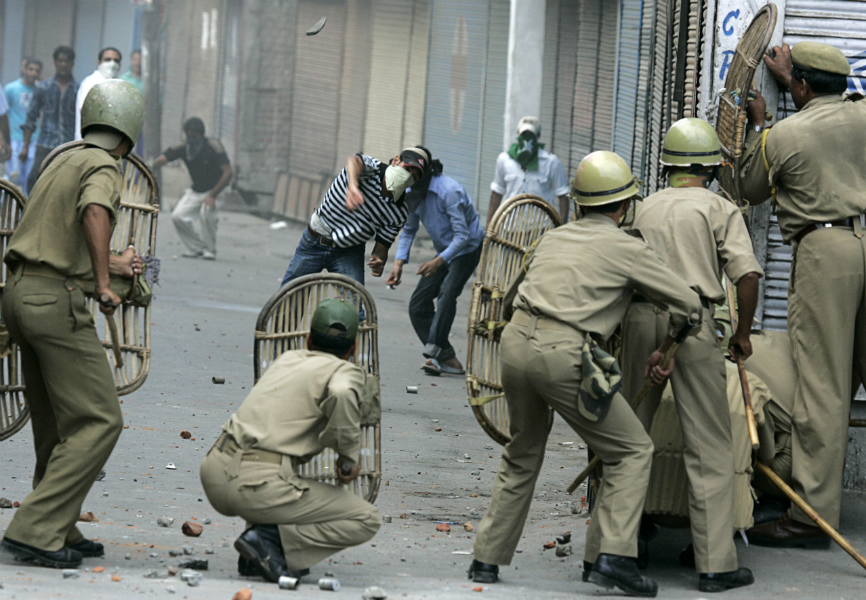The traditional summer flare-up of violence in Kashmir could be the worst ever this year as Indian Prime Minister Narendra Modi takes a hard line toward militant groups there ahead of next year's general elections.
Over the weekend, police and soldiers imposed yet another lockdown in the disputed Himalayan valley because of protests marking the anniversary of a popular leader's death. And just a few weeks ago, Modi's Bharatiya Janata Party exited a three-year old alliance with the People's Democratic Party—a regional party in Kashmir—leading the state to fall under direct rule by India's central government. That will allow Modi a freer hand to burnish his tough-on-terrorism credentials.
The new approach toward Kashmir comes amid a shift in Indian attitudes toward a region that has long suffered from separatist violence and triggered multiple wars between India and Pakistan. Kashmir was divided between the neighboring countries following a brief war after the British left the Indian subcontinent in 1947. But Pakistan stakes a claim to all of Kashmir, as the majority of its inhabitants are Muslim; India counters that it is a secular nation, so the religious makeup of Kashmir is irrelevant.
Violence intensified in the 1980s when a militant uprising in India's portion lead to a dramatic increase in terrorist incidents in Kashmir and India more broadly, prompting a muscular response by the Indian military. Many believe that Pakistan's intelligence service was, and remains, a sponsor of this movement, a view bolstered by statements of retired heads of the so-called Inter-Services Intelligence agency.
Yet over the years, while India sought to clamp down on the militants, it also took a sympathetic view toward their aspirations. Successive governments in New Delhi defended the special autonomy granted to Kashmir in the Indian constitution, which includes special rights for Kashmiri citizens and property ownership restrictions for non-Kashmiri Indians living there. Their approach to pacifying the region was to ensure its autonomy, not be too aggressive with prominent militants, and try to make Pakistan a part of the eventual solution.
Indian governments, especially those led by the Congress party, engaged with and negotiated with the All Parties Hurriyat Conference (Hurriyat), a political organ for militant leaders in India-administered Kashmir. The Hurriyat largely rejects India's claim to the region and supports its accession to Pakistan, which many think is responsible for creating the group. Pakistani diplomats and leaders who visited India have even been allowed to meet with the militants.
But shifting demographics have undermined support for that approach. Half of all Indians were born after the rise of militancy in Kashmir and have always lived under the threat of terrorism. Those outside of Kashmir blame Pakistan for the violence, do not have memories of peace in autonomous Kashmir, and do not have any sympathy for militant leaders who want to break away.
This is the sentiment that Modi is tapping into. He has blocked Pakistani diplomats in New Delhi from meeting the Hurriyat, directed India's intelligence agencies to monitor and restrict its funding, and is now on the cusp of ordering a major military offensive in Kashmir backed by special forces.
The push dovetails with Modi's narrative that the Congress party, now in the opposition, has undermined the nation's security and global standing and that he will right the wrongs of past. This summer—warmer weather allows for more protests and opens mountain passages between Pakistan and India to militant crossings—offers him the last good opportunity to drive this point home before next year's elections. In politics, timing is everything.

 Kashmiri protesters throw stones towards Indian policemen during a protest over the death of a youth in Srinagar August 4, 2008 | (REUTERS)
Kashmiri protesters throw stones towards Indian policemen during a protest over the death of a youth in Srinagar August 4, 2008 | (REUTERS)